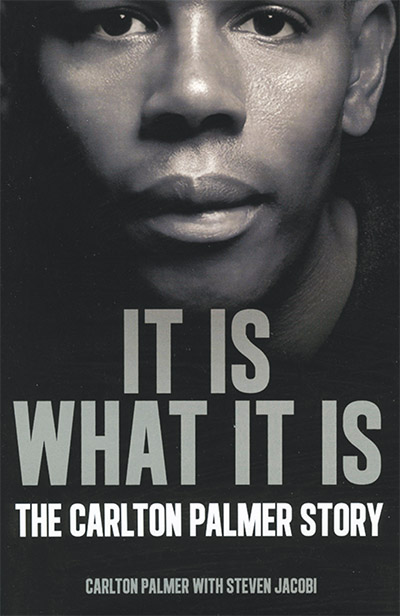
by Carlton Palmer with Steven Jacobi
Vertical Editions, £17.99
Reviewed by Andy Hockley
From WSC 378, September 2018
Buy the book
As a Sheffield Wednesday fan, I loved Carlton Palmer as a player. Given that he seems to be a divisive figure this feels like a confession I need to make. Ideally, then, I’d like to say that this autobiography is full of long, apparently awkward and ungainly sentences that magically coalesce into something that turns out to be a truly excellent book. It’s not exactly like that but, like watching Palmer play, it is worth not leaping to first conclusions.
Instead of the usual tabloid or local journalist, Palmer has chosen as his ghost writer Steven Jacobi, playwright and former Royal Literary Fellow, who previously collaborated on actor Ian Holm’s autobiography. Jacobi tries, as much as possible, to write in Palmer’s voice. At times this feels like it might be the book’s biggest failing.
Occasionally a beautifully crafted sentence will slip past and you are left wondering what it would have been like if all the chapters had been so well fashioned. The chapter on his abortive management career at Stockport and Mansfield is brilliant – from “A young player-manager with a clear plan and a point to prove. What could go wrong?” to “You find the only enjoyment in the job is the training. Gradually you come to realise that you hate match days” and beyond, in ten pages of stream-of-consciousness inner-monologue capturing the frustrations of a highly competitive man who knows what he wants to achieve but for whom everything seems to fail spectacularly.
However it is understandable that Jacobi has endeavoured to leave it in Palmer’s voice, even when uncomfortable things are being said. At first, for example, the chapter on racism is quite disconcerting, as Palmer basically seems to be saying that most casual prejudice is worth ignoring, and just there to try and gain an advantage. But then underneath, it becomes apparent that his point is that the casual and repeated racial abuse he suffered on and off the pitch was much less of an issue than the deeply ingrained racism that he perceives at the FA and BBC (to name but two).
Palmer is clearly a hard-working, hard-drinking, uncompromising, stubborn, competitive man, and this comes across repeatedly in the book. He even manages to aggressively give up drinking when Howard Wilkinson, his manager at Leeds, suggests he cut down (but then when his performances suffer, he goes back to it). It is this combination that means the book finishes on a low note. After a recent heart attack nearly kills him, he vows to keep playing football, training and drinking, regardless of the consequences.
In the introduction Jacobi writes that he hopes one day he can write a book about Palmer in retirement (he’s currently academy director at a school in Shanghai), playing golf, all flailing elbows and clothes that don’t suit him. It’s clear that while he sees comedy gold in that future book, his real fear is that he will never have the opportunity to write it.